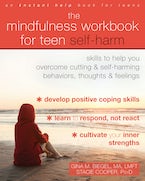By Gina M. Biegel, MA, LMFT, and Stacie Cooper, PsyD, coauthors of The Mindfulness Workbook for Teen Self-Harm
As a nation, we have been inundated and bombarded with countless news stories sharing illness, loss, isolation, anguish, hopelessness, and fear through the coronavirus pandemic. It is, of course, important to acknowledge all of these—and the very real and profound crisis on our hands, as well as the collective anxiety it is creating. However, it is just as essential to look at the wisdom, insight, heroism, and truly meaningful growth that can—and has already—come as a result of individuals, communities, and humanity as a whole working together.
We have recently been teaching online mindfulness-based stress reduction for teens (MBSR-T) groups. It just so happened that we were in the middle of one of these groups when the pandemic began to ramp up. This week, one of the teens in our group shared her experience of being home right now with the virus. She has symptoms, but is able to stay at home in isolation. We asked teens (spread across the country) to share how they have been coping with the coronavirus pandemic. After having the privilege to hear from them directly, we felt a duty to share what we have learned, which conveyed a sense of mindful appreciation, gratitude, and adaptability. We were impressed, to say the least, to hear what they had to share—and inspired by their ability to resource themselves and make the best out of these difficult times without a certain end in sight.
These teens offered profound insights and expressed compassion and wisdom in the midst of adversity, as their entire worlds have been turned upside down and abruptly put on pause. Many aren’t going to graduate with their friends, or attend prom, or turn sixteen and have their friends by their side. However, many were optimistic and finding creative ways to be social in the midst of physical distancing. One teen who just celebrated her sixteenth birthday this week found that one friend had dropped a present on her porch, and another drove by and waved from afar, reminding her that she has support. Teens in our class described spending quality time at home with their families playing games; and engaging in mindful cooking, baking, and painting as some of the things they are doing to fill up their time being sheltered in place.
Teens expressed having time to catch up on sleep, spend time with their pets, or to just be. There were clear themes of going with the flow, finding meaningful ways to connect with friends and loved ones, exploring their creative side, and going back to basics—whether that involved experiencing increased gratitude for their basic needs being met for shelter, water, and food, or a reflection on their core values as individuals, like love and compassion. Many seemed to have had a significant perspective shift on what matters to them. Many described becoming more mindful, present-focused, and appreciative of some of what used to be taken for granted, including a delicious home-cooked meal or their loved one’s health. We were moved to hear their answers to our question. It also imbued us with a sense of hope for the future. Download and work through Taking Control of Your Life for an activity to help focus on your strengths, unique gifts, and resilience.
Coping during Difficulties: Use the Three Cs
It is necessary to ramp up your positive coping skills during difficult times. Positive coping skills are actions you can engage in that can ease your problems and pain, and hopefully make you feel better. Download Negative Coping Behaviors and Positive Coping Skills for an activity to help you identify and evaluate possible negative coping behaviors, and to learn a whole host of positive coping skills you can use. You can also learn to focus and harness your core values, creativity, and connection—the three Cs.
Core Values
Values are the qualities you consider important to you, and a way to live your life. Use these to guide your actions and choices. Values provide a reason to keep moving forward, even when things are difficult. Previous research findings suggest that connecting to personal values can enhance individuals’ resilience in the face of stress.
One simple writing activity that you can do is to spend a few minutes describing:
- A current challenge;
- the reasons it is worthwhile to persevere and get through the challenge; and
- the values that are important to you that can help you persevere and rise up out of the challenge. Some examples of values are being altruistic in your community, offering compassion to others, and personal growth around how you perceive the world.
You can also create a values list and put it up as a visual reminder—say, on your mirror or fridge—of your core values that are important to you. These can help serve as a ray of light during dark times, and help keep you going.
Creativity
Tap into your creative side. This is a great way to engage in self-care and also distract from a focus on the news, what you aren’t able to do, and the negative; and instead get you into the driver’s seat of what you can still do. Being creative can facilitate the positive side of your brain and grow new, positive neural connections, otherwise referred to as positive neuroplasticity. You can change your brain in response to how you use it, and being creative is one great way to change your brain to take in the good, and refuel and recharge yourself. When you do this, you are better able to manage and tolerate what life sends your way.
What is your creative jam, so to speak? What are the things you like to do that get you in touch with your creative side? Do you paint, do puzzles, learn a new musical instrument, read, write, journal, cook, bake, learn a new language, build something, play a game? These are some of the examples teens told us just this week. Countless studies show that teens can increase focus, reduce anxiety and depression, and improve their overall well-being by incorporating creativity into their lives. Creating something can also provide you with a sense of control and empowerment in a situation in which many of us currently feel out of control.
- Create a list of the things you would like to do that engage your creative side.
- Do one of the things on your list—whether it be artistic or scientific; get creative.
Connection
In addition to our basic needs for food, shelter, water, etc., we have fundamental needs for safety, security, and connection. Right now, we are abiding by the rules in place to protect the health of ourselves and others by practicing physical distancing; this doesn’t mean we have to be socially distant too. Connect and reach out to loved ones—face-to-face on the screencalling someone on the phone, or texting whenever possible. Bring your creativity in to connect with others. Think of creative ways to be connected while physically apart. Have a movie-watching party online, or play a virtual game with friends. Lastly, ask yourself who could use the support, and reach out to them. Also recognize that if you are the one in need, it is important to reach out for support too.
To learn more about our next teen and young adult group, go to: www.stressedteens.com/group-for-teens
Gina M. Biegel, MA, LMFT, is a psychotherapist, researcher, speaker, and author of Be Mindful and Stress Less. Learn more at www.stressedteens.com.
Stacie Cooper, PsyD, is a teen life coach, mindfulness-based stress reduction for teens (MBSR-T) instructor, and coauthor of The Mindfulness Workbook for Teen Self-Harm.



 2024 Peace Playbook: 3 Tactics to Avoid Clashes with Your Partner
2024 Peace Playbook: 3 Tactics to Avoid Clashes with Your Partner